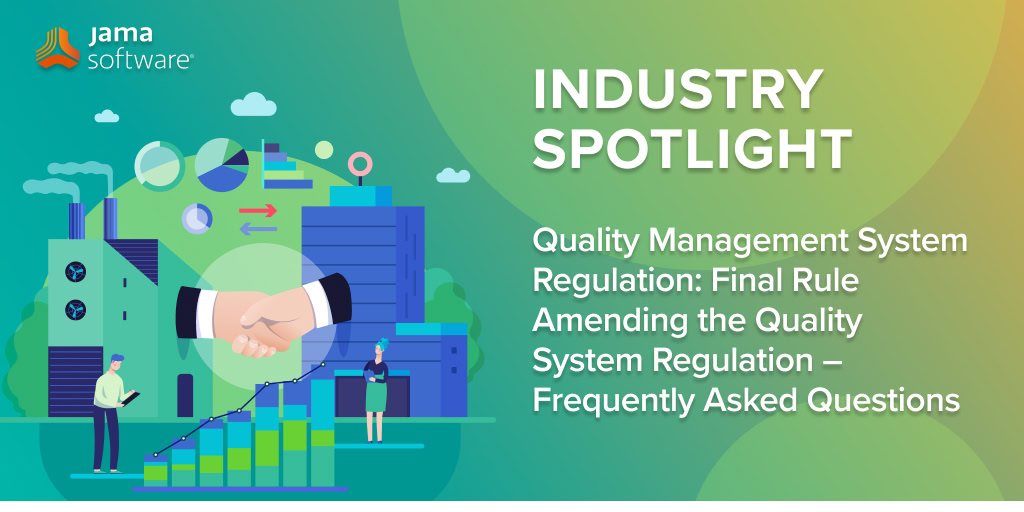
Jama Software is always looking for news that would benefit and inform our industry partners. As such, we’ve curated a series of customer and industry spotlight articles that we found insightful. In this blog post, we share an article from the U.S. Food & Drug Administration, titled “Quality Management System Regulation: Final Rule Amending the Quality System Regulation – Frequently Asked Questions”
Quality Management System Regulation: Final Rule Amending the Quality System Regulation – Frequently Asked Questions
Update: August 7, 2024
The revised part 820 is now titled the Quality Management System Regulation (QMSR). When referring to the rule that is currently effective, the FDA uses the term “Quality System (QS) Regulation” or “QS regulation.” Because both the QMSR and the QS regulation are located in part 820, wherever possible, the FDA has used the terms “QS regulation” and “QMSR.”
Listed are resources pertaining to the Quality Management System Regulation requirements and resources for implementing a quality management system:
- “AAMI/ISO 13485:2016, A Practical Guide
- “AAMI TIR102:2019, U.S. FDA 21 CFR mapping to the applicable regulatory requirement references in ISO 13485:2016 Quality Management Systems
- IMDRF/GRRP WG/N47 FINAL:2024 (Edition 2), “Essential Principles of Safety and Performance of Medical Devices and IVD Medical Devices”
On January 31, 2024, the FDA issued a final rule amending the device current good manufacturing practice (CGMP) requirements of the Quality System (QS) Regulation under 21 CFR 820 to align more closely with the international consensus standard for Quality Management Systems for medical devices used by many other regulatory authorities around the world.
This rule amends 21 CFR 820 by incorporating by reference the quality management system requirements of the international standard specific for medical device quality management systems set by the International Organization for Standardization (ISO), ISO 13485:2016. The FDA has determined that the requirements in ISO 13485 are, when taken in totality, substantially similar to the requirements of the QS regulation, providing a similar level of assurance in a firm’s quality management system and ability to consistently manufacture devices that are safe and effective and otherwise in compliance with the Federal Food, Drug, and Cosmetic Act (FD&C Act).
The rule amends the title of the regulation and establishes additional requirements that clarify certain expectations and certain concepts used in ISO 13485. These additions ensure that the incorporation by reference of ISO 13485 does not create inconsistencies with other applicable FDA requirements. This revised part 820 is referred to as the Quality Management System Regulation (QMSR). The FDA has made conforming edits to part 4 (21 CFR part 4) to clarify the device Quality Management System (QMS) requirements for combination products. These edits do not impact the CGMP requirements for combination products.
This action continues the FDA’s efforts to align its regulatory framework with that used by other regulatory authorities to promote consistency in the regulation of devices and provide timelier introduction of safe, effective, high-quality devices for patients.
This section provides answers to frequently asked questions related to the final rule. These questions and answers provide clarity and do not introduce any new policies or modify any existing policies.
RELATED: Streamline FDA CSA for Medical Devices and Life Sciences with Jama Connect®
Q: Why is the FDA taking this action?
A: The FDA is focused on advancing and continually improving the quality, safety, and effectiveness of medical devices to meet patient needs. This action, if finalized, will harmonize key areas of a device manufacturer’s Quality Management System and will more closely align the United States with many other regulatory authorities around the world.
Q: What is the FDA doing to prepare for harmonization of the Quality System regulation with ISO 13485?
A: The FDA intends to engage in a variety of implementation activities including, updating information technology systems, training FDA staff responsible for assessing compliance with medical device quality management system requirements, developing an inspection process, revising relevant regulations and other documents impacted by this rulemaking, and communicating and educating stakeholders, including affected FDA staff, on the change.
Q: What training will FDA staff do?
A: FDA staff will be trained on the final rule, the revised inspection process and changes to associated policies and procedures. Additionally, broader Quality Management System trainings have been, and will continue to be, deployed within the FDA to familiarize affected staff with quality management system concepts and requirements.
RELATED: Jama Connect for Medical Device & Life Sciences Development Datasheet
Q: How will this rule impact FDA staff and programs?
A: FDA will continue to conduct its operations to protect public health, including inspections, incorporating the requirements of the rule. The greatest impact will likely be to internal trainings, which will be needed to familiarize staff with the new regulation as well as any updates to procedures, processes, and policies as a result of the change.
Q: Will there be a new inspection process?
A: FDA will develop a new inspection process to align with the requirements of the new Quality Management System Regulation (QMSR). The process will be developed for implementation when the rule takes effect (i.e., two years from publication).
Q. Now that FDA has incorporated ISO 13485:2016, what happens if the standard is revised?
A: Any future revisions to this standard would need to be evaluated to determine the impact of the changes and whether the QMSR should be amended. If needed, amendments to the QMSR will be implemented through rulemaking.
Q. When will the new regulation be effective?
A: The rule is effective two years after publication in the Federal Register. Until then manufacturers are required to comply with the QS regulation. The FDA will begin to enforce the QMSR requirements upon the effective date, February 2, 2026.
- With Hacks on the Rise, Manufacturers Hone Their Cybersecurity Smarts - January 23, 2025
- Jama Connect® Stands Alone as the Leader in Requirements Management Software - January 21, 2025
- FDA Issues Comprehensive Draft Guidance for Developers of Artificial Intelligence-Enabled Medical Devices - January 15, 2025